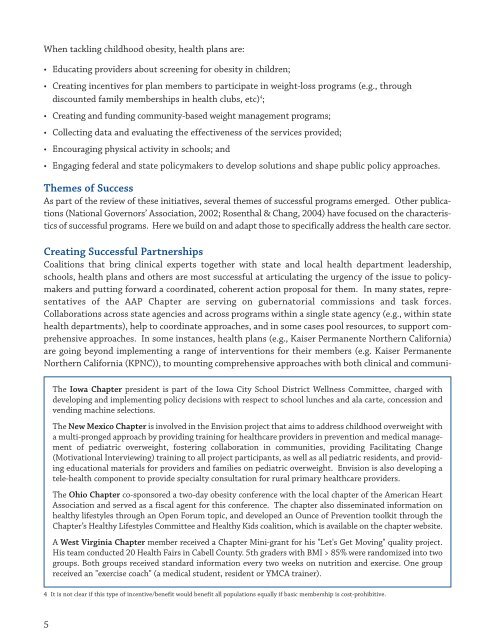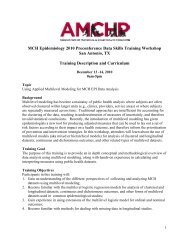Childhood Obesity: The Role of Health Policy - Association of ...
Childhood Obesity: The Role of Health Policy - Association of ...
Childhood Obesity: The Role of Health Policy - Association of ...
You also want an ePaper? Increase the reach of your titles
YUMPU automatically turns print PDFs into web optimized ePapers that Google loves.
When tackling childhood obesity, health plans are:<br />
• Educating providers about screening for obesity in children;<br />
• Creating incentives for plan members to participate in weight-loss programs (e.g., through<br />
discounted family memberships in health clubs, etc) 4 ;<br />
• Creating and funding community-based weight management programs;<br />
• Collecting data and evaluating the effectiveness <strong>of</strong> the services provided;<br />
• Encouraging physical activity in schools; and<br />
• Engaging federal and state policymakers to develop solutions and shape public policy approaches.<br />
<strong>The</strong>mes <strong>of</strong> Success<br />
As part <strong>of</strong> the review <strong>of</strong> these initiatives, several themes <strong>of</strong> successful programs emerged. Other publications<br />
(National Governors’ <strong>Association</strong>, 2002; Rosenthal & Chang, 2004) have focused on the characteristics<br />
<strong>of</strong> successful programs. Here we build on and adapt those to specifically address the health care sector.<br />
Creating Successful Partnerships<br />
Coalitions that bring clinical experts together with state and local health department leadership,<br />
schools, health plans and others are most successful at articulating the urgency <strong>of</strong> the issue to policymakers<br />
and putting forward a coordinated, coherent action proposal for them. In many states, representatives<br />
<strong>of</strong> the AAP Chapter are serving on gubernatorial commissions and task forces.<br />
Collaborations across state agencies and across programs within a single state agency (e.g., within state<br />
health departments), help to coordinate approaches, and in some cases pool resources, to support comprehensive<br />
approaches. In some instances, health plans (e.g., Kaiser Permanente Northern California)<br />
are going beyond implementing a range <strong>of</strong> interventions for their members (e.g. Kaiser Permanente<br />
Northern California (KPNC)), to mounting comprehensive approaches with both clinical and communi-<br />
5<br />
<strong>The</strong> Iowa Chapter president is part <strong>of</strong> the Iowa City School District Wellness Committee, charged with<br />
developing and implementing policy decisions with respect to school lunches and ala carte, concession and<br />
vending machine selections.<br />
<strong>The</strong> New Mexico Chapter is involved in the Envision project that aims to address childhood overweight with<br />
a multi-pronged approach by providing training for healthcare providers in prevention and medical management<br />
<strong>of</strong> pediatric overweight, fostering collaboration in communities, providing Facilitating Change<br />
(Motivational Interviewing) training to all project participants, as well as all pediatric residents, and providing<br />
educational materials for providers and families on pediatric overweight. Envision is also developing a<br />
tele-health component to provide specialty consultation for rural primary healthcare providers.<br />
<strong>The</strong> Ohio Chapter co-sponsored a two-day obesity conference with the local chapter <strong>of</strong> the American Heart<br />
<strong>Association</strong> and served as a fiscal agent for this conference. <strong>The</strong> chapter also disseminated information on<br />
healthy lifestyles through an Open Forum topic, and developed an Ounce <strong>of</strong> Prevention toolkit through the<br />
Chapter’s <strong>Health</strong>y Lifestyles Committee and <strong>Health</strong>y Kids coalition, which is available on the chapter website.<br />
A West Virginia Chapter member received a Chapter Mini-grant for his "Let's Get Moving" quality project.<br />
His team conducted 20 <strong>Health</strong> Fairs in Cabell County. 5th graders with BMI > 85% were randomized into two<br />
groups. Both groups received standard information every two weeks on nutrition and exercise. One group<br />
received an "exercise coach" (a medical student, resident or YMCA trainer).<br />
4 It is not clear if this type <strong>of</strong> incentive/benefit would benefit all populations equally if basic membership is cost-prohibitive.



